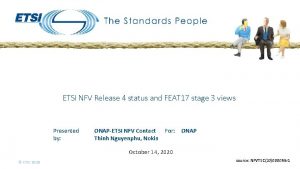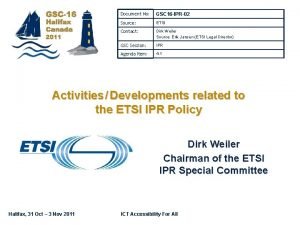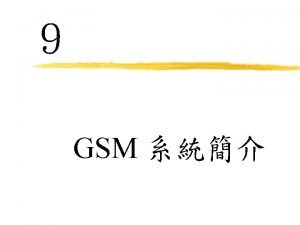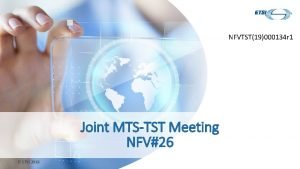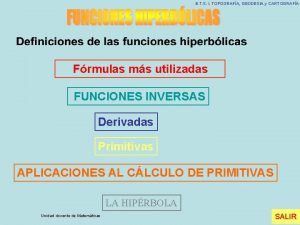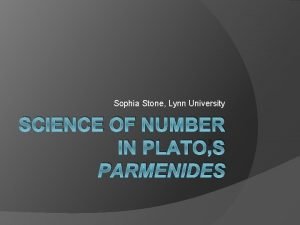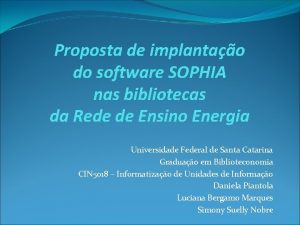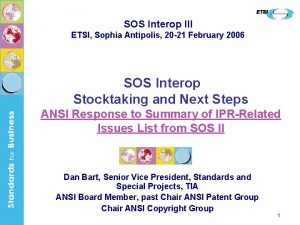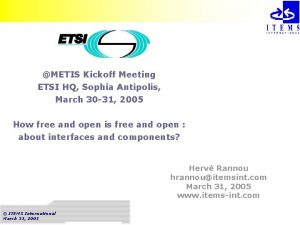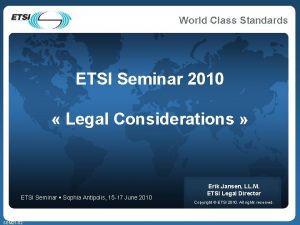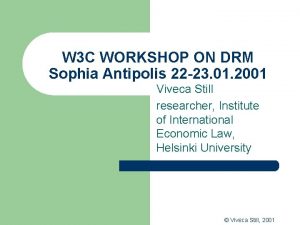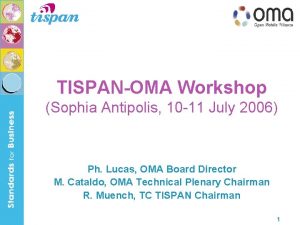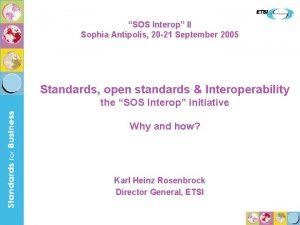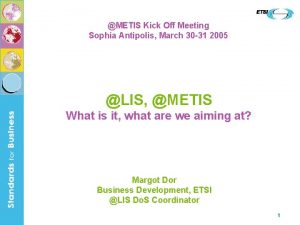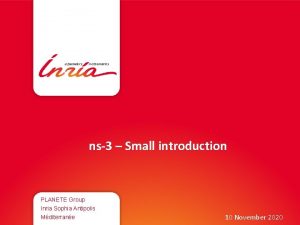ETSI TC ITS Workshop Sophia Antipolis 4 th



























- Slides: 27

ETSI TC ITS Workshop Sophia Antipolis 4 th February 2009 Intelligent Vehicle…. towards automated road Claude Laurgeau claude. laurgeau@mines-paristech. fr 1

La Jamais Contente ( Never Happy) Paris 1 May 1899 World record : 105, 8 km/h Michelin tyres Electrical motor(50 KW) Lead-acid battery (80 elements) 2

From horse-drawn carriage to engine car reins of the horse Steering wheel Lateral control Whip and brake crank acceleratoor and footbrake pedal Longitudinal control The coachman becomes a driver … but is man is still present 3

Present world situation : 9 6*10 human beings 9 1*10 vehicles in the world 6 70*10 new vehicles per year 6 1, 2*10 fatalities per year Energy consumption Environment impact Safety Mobility - congestion 4

Question Will we have driverless vehicles one the roads one day ? 5

Electronic signing …. Road is redeable 60 To day 60 To morrow my vision in 1995) In 2030 ? 6

GPS driven on board signaling 7

Demonstration of "On board signing concept" in 2000 8

Speed limit detection on highway 9

IV 2002 in Versailles Automatic driving demonstration RTMaps 10

IEEE Intelligent Vehicle Symposium and Demonstration 2002 • 20 -21 June 2002, Versailles, France • Demo track : 2 lanes highway with lane markings, 3400 m long , curves of 30 to 80 m radii 11

IEEE Intelligent Vehicle Symposium 2002 Automatic Driving Demo • 120 km/h on the straight road • 50 km/h on the curved road • Over 100 people took a test ride. 12

1997 The film begins with a stopped empty car on the side of the road. A man driven similar car overtakes it. The empty car follows the man driven car and seems to be dragged by it. The potential applications of that technology are stop and go platooning. 13

A driverless car overtakes a parked car and locates with its ultra sound sensors a free parking place. The onboard computer elaborates the manoeuvre and automatically parks the car. 14

GPS Vision Radar 15

Enhanced signaling by use of GPS -Vision Radar-CAN bus data fusion Following a car while approaching an intersection 16

Pedestrian detection and tracking Moving camera on bord the vehicle 17

The fleet of 4 Citroën C 3 18

Securing driving at intersection using V 2 V communication 19

Securing an intersection with I 2 V communication 20

Wifi DSRC 5. 9 Ghz 802. 11 a/b/g Family UMTS/GPRS Wimax 802. 16 Family Zigbee 802. 15. 4 DAB IR-MR TPEG Format CALM protocol. architecture OBU (Continuous Air-interface Long and Medium range) G P S On Board Unit T-PEG : Transport Protocol Experts Group Road Side Unit IPV 6 21

ROAD MAP TO AUTOMATIC DRIVING STEP 1: Longitudinal control with variable speed set point delivered by GPS&GIS (VSC : Variable Speed Control ) STEP 2: Lateral control (ALK : Automatic Lane keeping) Longitudinal and maneuvers assumed by the driver. STEP 3: Fusion of STEP 1 and STEP 2 with automatic lateral and longitudinal control. The human driver assumes only supervision since we are on a free lane. 22

STEP 4: A second vehicle is added and ACC : Adaptative Cruise Control at high speed is implemented. The driver is in charge of supervision and overtaking maneuvers. STEP 5: Identical to STEP 4 but at low speed which necessitates the stop and go implementation (Stop and Go). The driver is still in charge of supervision and overtaking maneuvers. STEP 6: Identical to STEP 5 but the robot is in charge of overtaking maneuver of the slowest vehicle. The driver is only in charge of supervision. At step 7 we have reached the level of automatic driving on highway but not yet in urban 23

Electronics in automobile Past Present To day, 70% of automotive innovation are issued from electronics Source: Minalogic 24

Question Will we have driverless vehicles one the roads one day ? Yes We can ! 25

Happy End 26

Road analysis: detection of lanes, horizontal continuous or discontinuous lines and localization of the car on its lane. The film shows the robustness of the algorithm related to illumination and forks on the highway. 27
 Natuvion sophia
Natuvion sophia Carmine rizzo
Carmine rizzo Recruit etsi
Recruit etsi Etsi reitti
Etsi reitti Etsi gs nfv-ifa 011
Etsi gs nfv-ifa 011 Etsi - ict standards
Etsi - ict standards Etsi gr nfv-ifa 029
Etsi gr nfv-ifa 029 What is etsi
What is etsi Etsi portal
Etsi portal Etsi mano architecture
Etsi mano architecture Nfv isg
Nfv isg Etsi ipr
Etsi ipr Etsi nfv release 4
Etsi nfv release 4 Etsi ipr database
Etsi ipr database Etsi ipr database
Etsi ipr database Etsi cim
Etsi cim New standard institute
New standard institute Etsi gs nfv-ifa 011
Etsi gs nfv-ifa 011 Etsi topografia
Etsi topografia Raul and sophia were having a picnic
Raul and sophia were having a picnic Sophia pandey
Sophia pandey Sophia schliemann
Sophia schliemann Huckleberry finn game
Huckleberry finn game Sofia stone biografia
Sofia stone biografia Sophia gardens events
Sophia gardens events Sophia software
Sophia software Santa sophia the gables
Santa sophia the gables Filosofia philos sophia
Filosofia philos sophia












